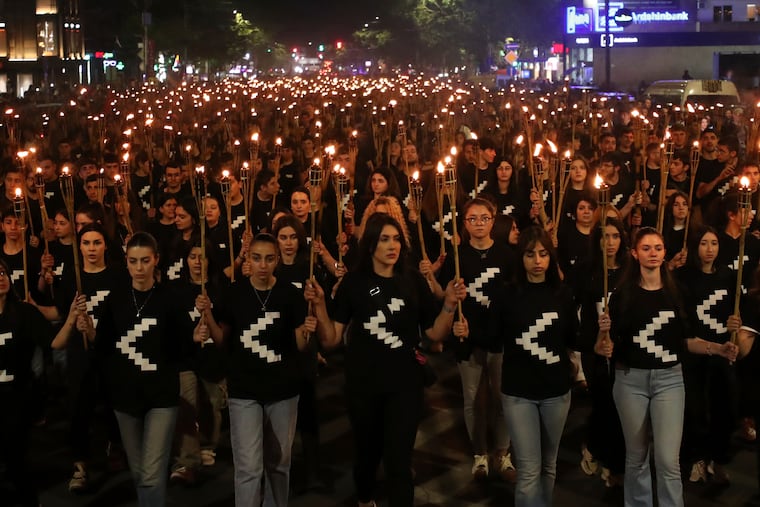Will the world prevent another Armenian genocide?
A monthslong siege in the South Caucasus region by Azerbaijani forces has created a humanitarian crisis that is nearing catastrophe and is now widely believed to constitute an effort at genocide.

In the year that marks the 75th anniversary of the Genocide Convention, the world faces the real threat of a second Armenian genocide, this time in the contested South Caucasus region of Nagorno-Karabakh, also known as Artsakh.
Since Dec. 12, the Azerbaijani regime of President Ilham Aliyev, openly supported by Turkish President Recep Tayyip Erdoğan, has been blockading the 120,000 ethnic Armenians in Artsakh by preventing the movement of vital supplies and people along the Lachin corridor, the only road connecting the area to Armenia. On June 15, Azerbaijan completely sealed off the region from the outside world. Even the International Committee of the Red Cross is not able to enter.
This total siege has created a humanitarian crisis that is nearing catastrophe and is now widely believed to constitute an effort at genocide — either by starving the population to death or by forcing it to flee and thus destroying a civilization.
Aliyev’s aggressive policies toward the indigenous Armenians in Artsakh are not surprising. His military seized much of the disputed enclave in a 2020 war that ended with Russian peacekeepers in the area. Aliyev now covets the core that remains as well as part of Armenia proper, and he is hoping that Russia’s preoccupation with Ukraine, Turkey’s importance as a broker with Russia, and the European Union’s hopes for Azeri natural gas will create a space in which he can act with impunity.
The foot-dragging of the international community in the face of this potential genocide is harder to understand, particularly now that there is so much more awareness of early warning signs and global training of government officials in genocide prevention.
Genocide experts have taken note of the way in which Aliyev’s statements have made clear that he has set his sights on a total victory over the Armenians of Artsakh, which will constitute a fulfillment of, in his words, a “historic mission” and a restoration of “national dignity.” His ideology of an Armenian cosmic foe closely resembles the ideologies of some of the most deadly perpetrators of genocide in history.
On the ground, there have been horrific atrocities perpetrated against Armenian civilians and soldiers that aim at humiliating and desecrating Armenian identity, many of which harken back to the atrocities of the Armenian genocide of 1915-1923. Indeed, Aliyev’s regime has lauded the Ottoman war criminals who committed those century-old atrocities.
Because of these alarming red flags for genocide since the 2020 war, international nongovernmental organizations and professional groups devoted specifically to the prevention of genocide have been sounding the alarm about a threatened genocide in the region. Some American politicians have joined them.
The Philadelphia-based Lemkin Institute for Genocide Prevention, which I helped found, along with Genocide Watch and the International Association of Genocide Scholars have each published statements and alerts.
Others, including Luis Moreno Ocampo, the former lead prosecutor of the International Criminal Court, have warned that the population of Artsakh is at serious risk of genocide.
Aliyev is clearly using the blockade as a test of the international community’s commitment to protecting Armenians in their ancestral lands — a test that the international community has so far failed. The international press has displayed only lukewarm interest, and foreign diplomats are engaging in the language of false equivalencies. This sends a dangerous green light to Aliyev.
The hope that genocide can be avoided through a “peace” deal is naive. And Aliyev has demonstrated time and again his contempt for international law and treaties. Not only has he routinely violated the tripartite cease-fire agreement that ended the 2020 war, but he has also proudly ignored the binding order of the International Court of Justice earlier this year that mandated he immediately lift the blockade.
Almost all the red flags of genocide are evident now. Western leaders ignore them at their peril. The stakes are incredibly high — and not just for Armenians. If the international community sits by idly as a genocide occurs, it could spell the end of multilateralism in the world order.
Genocides are hard to imagine until they happen. Once underway, they are almost impossible to stop. For this reason, 75 years ago, the international community agreed on the 1948 Convention on the Prevention and Punishment of the Crime of Genocide. The hope was that with the proper institutions, we may be able to identify this man-made catastrophe before it happens and prevent it.
We have the institutions to stop an Armenian genocide this time around. The question is: Will we use them?
Elisa von Joeden-Forgey is an endowed chair in the department of Holocaust and genocide studies at Keene State College. She is cofounder and executive director of the Lemkin Institute for Genocide Prevention, based in Philadelphia.